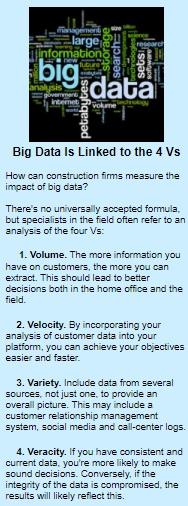It may be time for your construction firm to think big. Big data that is.
“Big data” is a term often used to describe the vast repository of information collected from various technology sources, including smart phones, social media, GPS devices, sensors, cameras, bots, computer algorithms and satellites.
The concept of big data analytics is being embraced by companies across the country and it’s proving beneficial in many ways, ranging from marketing to construction-site analysis to scheduling.
Among the ways your business can leverage big data analytics are:
Handling Data. Your construction firm likely juggles many projects simultaneously. Those projects generate huge amounts of data that must be collected, organized and analyzed. Big data analytics allows you to quickly process that information, freeing up time to focus on job-site issues.
Predicting Risk. Your business needs to predict risks accurately to plan and complete projects efficiently. Using big data analytics can help you gain insight that will help improve cost certainty and identify potential problems.
Organizing Sites. Using sensors in cars, machines and trucks, combined with the schedule of the project and traffic information, algorithms can sort out the best routes at job sites, decreasing fuel costs and waiting times. The locations of equipment can quickly be identified and you can tell how tools are being used and when they need to be replaced. Sensors on machines can flag abnormal events quickly and maintenance teams will know exactly what’s wrong and the parts they’ll need for repairs. This can reduce a machine’s downtime.
Building Better Budgets. Construction firms sometimes miss the mark when estimating costs. Big data analytics provides a better chance at formulating a precise budget based on information about job sites and personnel availability as well as the prices of materials, suppliers, human resources systems and communication. What’s more, the data can help you bring in jobs on time, reducing costs still further.
Despite the advantages, however, big data can create problems, particularly when you first begin implementing it. Here are five steps to take that can help minimize the problems and maximize the benefits of big data.
1. Protect Data. High profile data breaches, such as those involving Target Corp. and Home Depot, have caused concern for most companies collecting big data. The security protections you installed years ago may no longer be adequate. Make a long-term commitment to safeguard this asset by continually upgrading the equipment and, if need be, hiring extra staff to keep it protected and running smoothly.
2. Refine Processes. The amounts of data collected will be vast, and there is a possibility of wasting inordinate amounts of time and resources wading through it. The main challenge is finding the information that’s valuable and discarding the rest. Refine your procedures for sifting through information to quickly get to the core of what you need.
3. Stay Nimble. In some respects, big data has leveled the playing field, so it’s easier for smaller firms and start-ups to cut in on the action. If you’ve spent years building your firm, you might be vulnerable. Think like your smaller competitors. Big data should open up niches that you can try to fill before others do. Devote time and energy to market research and react quickly to changes and developments in the industry.
4. Share the Wealth. Some firms suffer from lack of communication between departments. Communication across the company, and through departmental barriers, is critical to the successful use of big data. Some of the responsibility relates to data management, so be sure key members of your team are properly trained in disseminating information that people need to do their jobs most effectively.
5. Find Balance. Sometimes when owners of construction firms ask questions, they don’t like the answers. The same is true when you analyze the data you collect. The results may suggest a need for major changes that you’ve resisted or are dead-set against. In this situation, listen to the data but don’t abandon the instincts or business philosophy that made you successful in the first place. Use the information to make informed decisions but don’t follow it blindly.
The possibilities of big data seem endless. If your company hasn’t entered into this arena, it should consider doing so soon or risk being left in the dust. On the other hand, you’re defeating the main benefits of the new technology if you allow it to overwhelm your operation. Work with the latest tools at your disposal while relying on common sense and business acumen to provide better results.
Copyright © 2022



